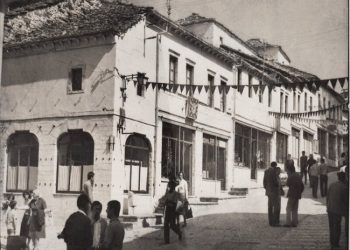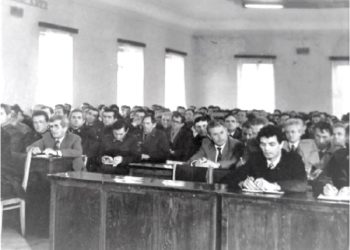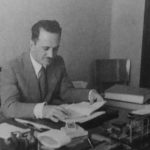
Ejëll Çoba
Memorie.al publishes some parts from the memoir of the author Ejëll Çoba, the well-known intellectual from the city of Shkodra, the sucker of one of the most famous families of that city, who after graduating from the University ‘La Sapienza’ of Rome in In 1932, he returned to his homeland where he practiced his profession, pursuing an administrative career, as ‘Dottore in Giurisprudenca’ and then for several years in the senior state administration, where he also occupied the period of occupation of the country, (1939- 1944), where he held several senior positions, as Director in the Ministry of Justice, Secretary General of the Council of Ministers, Deputy Minister of Internal Affairs, etc. His arrest in 1946, (together with his brother, Kelin) accused of participating in the ‘Postriba Movement’ and after a long investigation in Shkodra and Tirana, was sentenced to 25 years in prison, of which he suffered a full 23 years and five months, and five days in prison, in the terrible camps of forced labor, all the way to Burrell Hell. The unknown memories of Ejell Çoba, which come with an introduction by his fellow citizen, the famous writer, Zija Çela, present to the reader a panorama ‘painted with the brush’ of pain, where details and details are given about his sufferings in the camps. of the prisons of the communist regime of Enver Hoxha, as well as other accomplices, known and unknown names, such as: Father Bernardin Palaj, Guljelm Suma, Syrri Anamali, Ramdan Sokoli, Cin Serreqi, Father Karol Serreqi, Father Filip Mazrreku, Hamdi Isufi, Hafiz Ali Kraja, Beqir Çela, Musa Gjylbegu, Asim Abdurahmani, Kolec Deda, Nikoll Deda, Felatun Vila, Gjush Deda, Sali Vuçiterni, Emin Bakalli, Qani Katroshi, Sali Doda, etc., as well as some names of investigators, guards, State Security officers, such as Fadil Kapisyzi, etc.
Continued from the previous issue
Imprisonments
Memoirs written from August 1973 to the end of December 1977
Only extreme things can be tolerated
Count Rober de Montesquieu
I always thought hitting is the worst thing. For this reason, whenever I had replaced the investigating judge or prosecutor during my 30-year career as a judge, I had never hit anyone. Now that I was trying the shot myself, I felt superior, not only morally but also physically, because with this physique I would have been able to captain the first class.
The cry of a clear conscience, the fact that from my work had not come to anyone, no evil, gave me moral strength and arrogance. As the righteous have it even when the wicked can defeat it.
I, like the others, returned to the place of torture. For lunch I was given a loaf of bread that every prisoner had the right to eat. I realized that I would be given half a ration every two days. Immediately after lunch the investigators called us. The same questions and the same answers, and of course the same blows and shame. Late after lunch, the procession of prisoners who came out of need began.
The days were passing erru-gdhiju in the toilet, they were quite tired, naked, poorly fed, in the cold and sleepless and three times a day meeting with the investigator. Morality remained high day by day and the decision not to let me go became stronger in me; whatever happens!
Even the investigator showed no signs of fatigue or letting go. So, ten days passed. When he called me, as usual, the investigator told me: “Well, if we leave this matter for now, we will solve it later. But now I want to know how you organized the February 4 and February 28 killings. Go to the cell, think well and tomorrow I will come and ask you “, he ordered the guard to take me to the cell.
When I entered the cell, my friends joyfully asked me if I had escaped and if I had done the minutes. “NO,” I told them, “I only have one day off, and then the questions will continue.”
They frowned and explained to me that this was the usual procedure of torture: to leave a day or more of rest, give a mattress or even food and then call back and say, “Let’s get started!” the desolate prisoner, who has enjoyed some much-desired comfort, feels utterly helpless, and often surrenders and accepts not only what he has eventually done, but also what he has not done; and along with himself he takes others, collaborators or even completely innocent and without any knowledge.
I immediately fell asleep. I desperately needed sleep and warmth. I slept for about 20 hours. I felt like I was somewhat relaxed. I was also in a good mood and I was satisfied with the thought that the captain-investigator could not give up without being ashamed of his demands.
When it was almost 9 o’clock in the morning, the investigator called me again. He started asking me if I was relaxed. Get into the gentle conversation like the first time. I avoided provocation as much as I could. Pull and do not tear to upset him without anger, until he is convinced that his insistence on extracting what would be fruitless.
The second point the investigator wanted to know about was the preparation and execution of the killings of February 4 and February 28, 1944. It took me a little effort to convince the investigator that on February 4 I was not yet in the ministry., after I was appointed to that place on 13 February. This fact the investigator could easily ascertain through the official notebook that published the decree of my appointment, but the investigator for everything I said, held a systematic attitude of disbelief, at least skeptical, and in this attitude, he went so far that it did not seem to him convincing fact nor the date of the decree. For this he continued to ask why it was done, who did it and how the February 4 murders took place.
A considerable number of people were killed that day, the exact number of whom I do not know even today. The investigator told me 82 people. The same was written in the newspapers after 1944. For four days in a row, it was dark and you went to the toilet, with half a ration of bread every two days, they were stripped in that wet and cold winter, in a window without glass, I tried three times a day the fists and kicks of Captain Abdyl Haki Kuçi, I tried to convince him that for the 4th of February I had not the slightest knowledge. Last night we entered the case of the February 28 murder. The investigator began the question: “How did you find out about the murder of four people on the way to Russia?”.
On February 27, a police captain was killed in an assassination attempt. The assassins were caught during the day. As Hamdi Isufi later told me, they had been six. One was rescued by Mehdi Frashëri, the other by Hamdiu, who was the commander. Four others were executed within four hours for terror. I answered the investigator’s question with the utmost sincerity. In the morning of that day, before I went to the office, a woman who served in our family had come out early to buy me bread, she told me that on a street above our house, in Dajti Street, there were four people killed. In the office, after the minister had not yet left, I called Rrok Maloku, director of the Secret Office and asked him:
-What were these four killed on the way to Russia?
“They are the police assassins,” he replied shortly.
Maybe he didn’t know the other details either. Xhaferr Deva (Minister of Interior) did such work with his private secretary, Isuf Deva.
After a while, the Prime Minister, Rexhep Mitrovica, asked me by phone where the minister was, that he had not answered. I told him he had not yet left the office.
-Then, – he added, – go to his house and tell him that the Ministerial Council is meeting, which wants to know about four of the murdered.
As soon as I left, I met Minister Xhaferr Deva and Hysni Dema, Commander-in-Chief of the Gendarmerie, on the steps of the ministry. We went back to the office. I said the words of the Prime Minister.
“Okay,” he replied,
Go to the Council and say that elements of the left, yesterday killed a policeman and today elements of the right, have taken revenge, you killed four people of the left. The investigation is ongoing and we will let you know when it is over.
“I cannot send such an answer to the Council of Ministers,” I told him.
-Then, come with me to hear the answer, – he told me, and together, we went to the Prime Minister.
The council was discussing some other issues. How they ended, without asking anyone what, Deva took the floor and told the ministers, what she had told me. None of the ministers do. The Prime Minister moved on to other talks. During my stay in the ministry, neither in the Council of Ministers nor with Deva, this issue was not discussed anymore.
The investigator, as usual, wrote my words. I had the impression that he was trying to thicken the minutes as much as possible, even with preconceived notions. Nevertheless, he was unhappy and continued to torture me. I remember that he wanted me to claim that, as a deputy minister, I kept in touch with the German command.
I also remember that once he had lowered me to the cement, he tried to hit me in the back with the heel of the boot with such force that he lost his balance and went and slammed the door. The door opened and he crashed into the hallway, to the great surprise of the guard who was behind the door, who would surely have suspected that I had not slammed him with any punch or kick. On this point, the investigator insisted for 2-3 days and in the evening recalled that he had found irrefutable proof of my connection with the Germans as deputy minister:
“You say you did not have a working relationship with a German, but I have a document with your firm that proves such connections.”
-There can be no evidence or facts about things that did not happen! – I returned it.
-Do you give in writing that you have not had such connections? He insisted.
“Even one and at all costs,” I replied with the utmost certainty of what I was saying.
-Do you give me in writing that you will accept the death penalty, if I issue a document for your guilt? He continued.
“I am ready to accept the death penalty with my signature,” I replied firmly, with even greater vigor and almost with pleasure.
The investigator put a letter and a pen in front of me and started dictating to me to walk up and down the cells. I, ready, wrote with obvious pleasure and confidence.
When he came to the words: “I am ready to accept the death penalty”, he interrupted him, took my hand so that I would not continue writing and said in a loud voice: “Think well, do not take yourself anymore, I have the document in dossier”.
I continued to write forcefully and completed the statement. I read it aloud and signed it without stopping, and handed it to the investigator, who was left breathless. Without saying a word, he took it, thought about it, opened the file and took out a copy of a letter I had addressed to the Fier Gendarmerie Command, which said: “Although the Balli Kombëtar command claims that the communist forces in that district are the most many than those of Balli, and for this he seeks the help of the Gendarmerie, from the information that this ministry has from the German command, the communist forces in that district are… (I do not remember now that I am writing the figure), while those of Balli are… so many bigger, however, if that command is available, to send 10-15 gendarmes to help Balli”.
“Do you see,” the investigator shouted in a triumphant tone, “that you had any connection with the German command?”
– The German command almost every day – I replied – sent a bulletin to the Ministry, in which, among various information, it provided information on the forces and movements of the communist gangs. I also read those bulletins and from them I was informed about the communist forces, which was transmitted to the Fier command post.
The investigator did not know what to answer, closed the file and stood up. For a moment I hoped he would let me sleep on the mattress, but no, he called the dry guard and escorted me back to the toilet, to the place of torture. I was starting to get tired. It was the second ten days I was spending the night on foot, with half a ration of bread in two days. My legs had started to swell and boil.
Thus, day by day, more and more, the torturous days passed, but I felt that spiritually I was always strong and victorious over the brutality and malice of a communist investigator and of a completely unreasonable and savage method.
Exactly on the tenth day, the investigator told me to go to my cell, that the next day we would start asking questions about the third point. So, I slept on the mattress one night, warmed myself a little, because the cold had entered my marrow and I ate some of what my cell mates gave me, who did not even have enough for themselves.
The next day the investigator called me again and started talking about my activity (as he called it) during the two-year escape time. I tried to explain to him that I had not done any activity during this time. I tried to argue my thesis with the version for which my family members were also trying, i.e., who were outside Albania at the time, so no one should have known that I was in Shkodra. From this I was forced to have no connection with different persons.
The investigator wrote all the answers, but he did not seem to be convinced by my arguments and threatened me that I would pay dearly for my insistence on denying the facts. He said that for my guilt, there was irrefutable evidence, but he wanted me to admit it myself, which would ease my sentence. The truth infuriated my investigator, like the red ruby infuriates the bulls of Spain. Therefore, for the hundredth time, he exploded in fists and kicks, accompanied by insults from what he had learned in the pub he had previously held in Berat.
When he was more tired than I was, he ordered the guard to escort me to the place of torture. Thus, began the third period of torture: stripped, unkempt, tired, fattened, kicked in the body by beatings, but morally stronger and decided not to let go of anything, not only to the detriment of to others, but not even to the detriment of myself to blame that I had not committed.
At the place of torture, I found again Panajot Zbogin, who after a day of rest, resumed a new period of torture. This time I was placed in the last partition, near a half-window, without glass and with bars, overlooking the prison yard, where during the day I had the opportunity to see the convicted prisoners, most of whom I knew.
At night from that window came a cold smell, which lifted my body, especially when I was lying on the cement, because I was too tired from standing, from hunger and especially from lack of sleep.
Even during this third period of the investigation, the investigator called me in for questioning three times a day. To my insistence that I had no contact with any person during the escape, the investigator replied that I did not need to come into direct contact, because I had a “diplomat” at home, through whom I kept in touch. The allusion was to my brother, Kelin, who had worked as a diplomat in the Foreign Ministry since Zog’s time.
I tried to argue that I had no interest and it was even too dangerous for me for my brother to get involved in any activity, because if they followed in his footsteps, they would easily reach me.
-Yes, we arrested your brother, do you know? – told me.
“No,” I replied.
-He has confirmed all the activity carried out in your name.
“Take me here and I will prove to you that he lied to you,” I replied with the utmost certainty.
Upon hearing these words, the investigator exploded in furious blows like never before. Apparently, he kept this for a very valuable card that would ensure his success, at least at this point. But my confidence, based on the truth and the recognition of my brother’s determination (who, even on condition of his own life, would not accept to charge me), shocked the investigator greatly and infuriated him against me.
The end was the extension of my stay in torture. Hunger and especially thirst were bothering me a lot. At night, when there was a guard from Elbasan, short and with a typical peasant face, not a bad-tempered one, I had the courage to ask him for water.
“There is no water for the enemies of the people,” he said in a loud voice for others to hear, but after a while he returned with a two-liter pitcher. I grabbed her by the lips, and when the guard saw that I was drinking it all, he shouted at me: “Enough, enough!” Of course, not because the water hurt, but because it seemed to him that he was violating the order they received too much, they did not give us anything.
During these days I was going through torture, they brought us Asim Abdurrahman Shpuza, pharmacist, brother-in-law of Musa Juka and Veli Vasjari. He was arrested because he wanted to escape. Asim had the representation of the German pharmaceutical company “Bayer”. He was accused of collaborating with the Germans. Within a few days, Asim began to show severe signs of fatigue. He talked to himself and moved from one place to another for no reason. The bracket was increasing every day. One night, it was the thirtieth day of my torture, Asim was talking to himself in a loud voice. Panajot Zbogu, who was already with us, approached him and advised him not to move or talk, because the guard could hear him. It seemed to calm down, but after a while it started to get worse.
A week later, the investigator called me again and told me to sign the 17-page record sheet, to be copied in the machine. I told him I wanted to read it. He took me to a small corridor, opposite the investigator’s room, and said, “Read!” I doubted he had changed my words, so I read it carefully. From time to time the guard would come and say to me: “Hajt, did you read it, because the investigator is waiting for you”. I saw that he had not changed or added anything. I went and signed it sheet by sheet in the eyes of the investigator. That closed the page of my investigation.
I was now awaiting trial. I remember that once, after a very irritating conversation with the investigator, he, in order to scare me or why he did not know how to come up with excuses, said to me:
-Do you know that I kill you now that I say you wanted to leave? Do you know that I have no responsibility to kill you?
-Yes, yes, I know, I know – I answered firmly.
-Are you sure I do, and I have no responsibility? Do you know? – insisted.
-Yes, yes, I know, I know – I repeated in a confident and unhesitating tone, but also very ironic.
It seems to me that the investigator did not understand at all what I meant by that answer. I remembered this conversation later, in prison, when I heard from Hatif Toptan that his investigator had grabbed him by the neck one night and put him in the corridor leading to the prison yard.
My body rested, but not my mind, March and April also passed. I had no news from my family. I was deeply saddened by the arrest of my third brother, Philip. In early May, the guard brought me the indictment. One morning, Hamdi Isufi and I were escorted to court. On the way, I saw that two girls were coming from another street, and one of them had black glasses. As soon as he saw me, he took off his glasses. I knew her, she was a sister’s friend. When we arrived at the court, they let us wait for a while at the bottom of the stairs, until a group of defendants came out, among whom were Shefqet Verlac’s wife, Zef Guraziu, and it seems to me Izedin Beshiri.
During this time, a young boy, Ilia Xheka, came out of the door of one office and entered another, whom I had had as secretary in the court of Berat. After a few minutes, he left to return to the first office. He looked at me well, recognized me, came and shook my hand. I was amazed at the courage he had. I was glad there were people with courage. I asked her:
-Do you work here?
-Yes – he answered me.
He was secretary of the Military Court. I did not hear from him. Mabs slightly escorted us upstairs, to the courtroom. There came a civilian, who introduced himself as the prosecutor, and demanded the indictment. We gave it to him. After half an hour, bring them back. I looked. It was another copy. I saw that it did not contain the words: “… We handed over according to the law…”. I immediately told him:
-It’s not it, it does not contain that I have surrendered.
-They are the same – he answered me and started talking to Hamdina.
-You Hamdi, you were the District Commander in Elbasan. Who killed the prefect Musa Puka?
– It is known, Petrit Hakani – answered Hamdia.
-No, it remained a mystery.
– I was the District Commander and I know well – insisted Hamdia
-No, no – he shouted and changed the conversation.
Then they sent us back to prison, we were told it was too late and the trial will take place tomorrow.
The next day, on the way to court, Hamdia told me:
– The prosecutor is himself, Petrit Hakani.
“That’s what I found out,” I replied.
Along the way, behind the windows of a balcony, I saw the head of a woman looking towards us. When we approached him, he came out on the balcony and bravely said to me, “He is coming today.” She was still that sister’s friend and of course she was talking about the sister. It came in handy and I felt grateful for an interest I did not expect. Even that day there was no trial and we were returned.
The next day, along the way, I had my eyes on the balcony, where I saw my sister’s friend. And I really saw on the balcony that girl and my brother, Philip. I was very happy, at least one brother is free. The suspicion I had for five months was clarified. The chairman was Gjon Banushi from Mallakastre. After all the questions about the actions of the governments of the time of the occupation, the mayor read a telegram to the Prefecture of Vlora, where it was ordered to carry out an operation in a village of that district, occupied by the communists, which was allegedly signed by me. /Memorie.al
The next issue follows




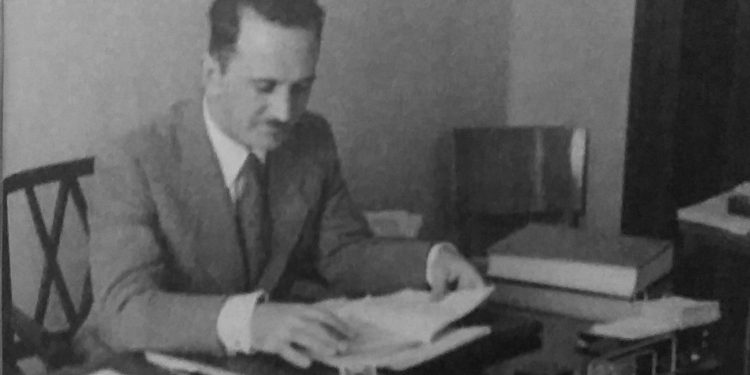
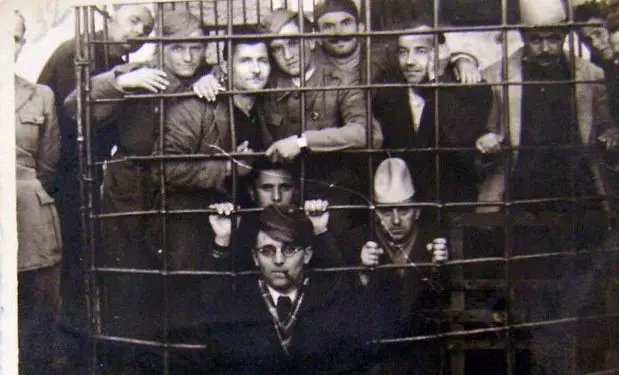
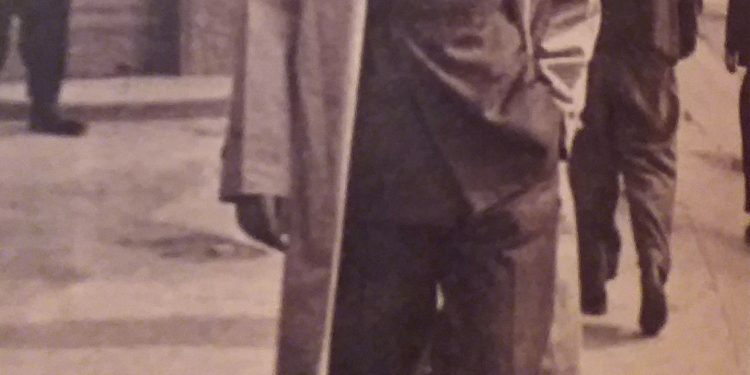
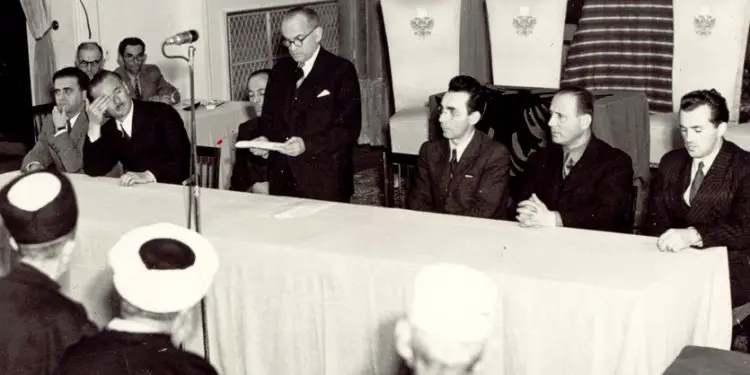


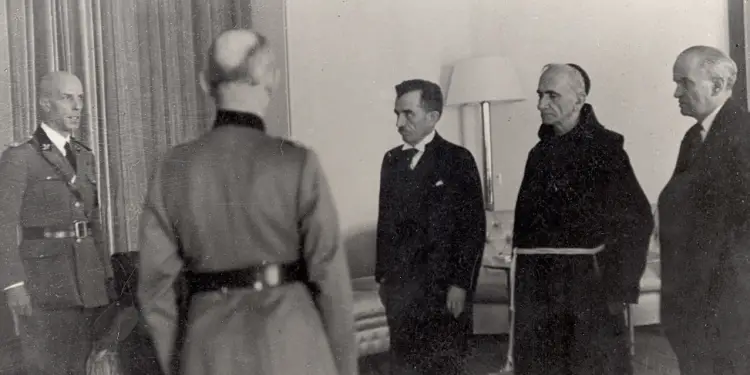
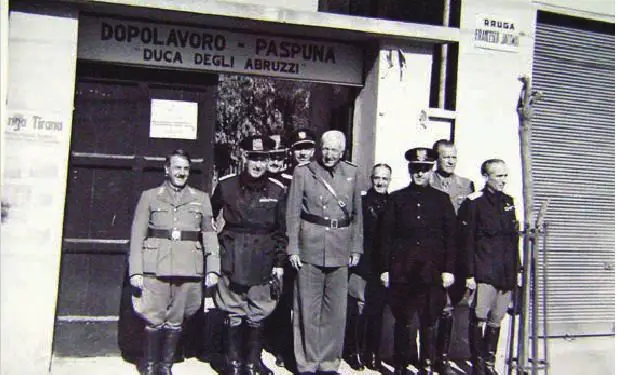
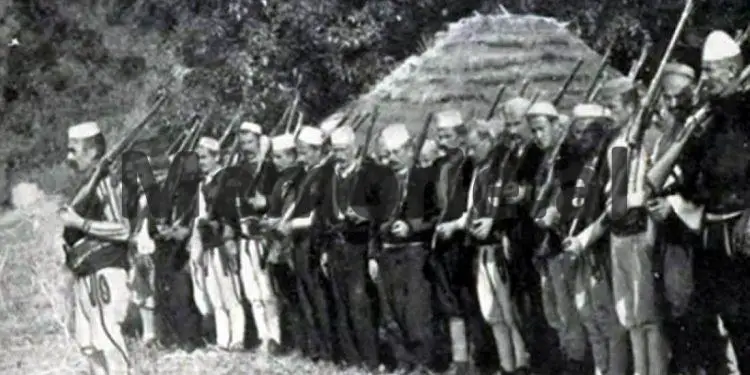
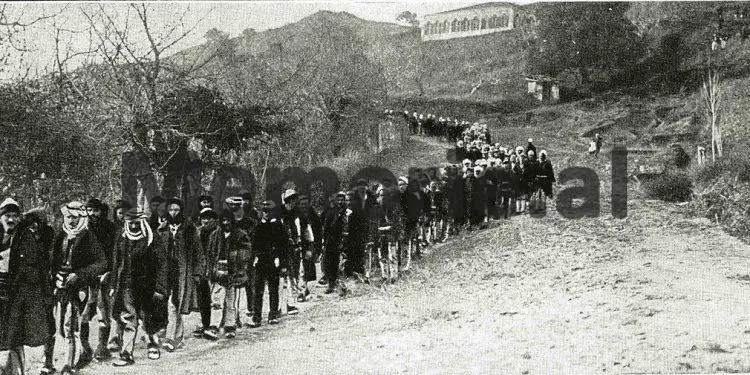
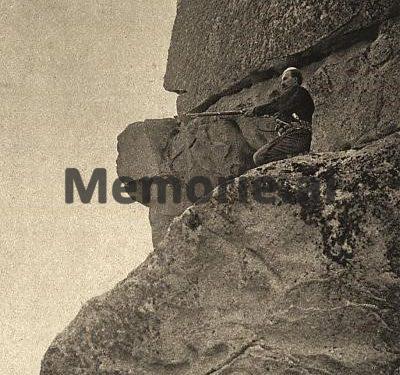
![“When the camp commander, in the presence of the group accompanying him, said to the convicted journalist: ‘Why did you exchange this beautiful profession for the Spaç wagon [mine cart/labor], he [the journalist]…”/ The unknown story of January 10, 1983](https://memorie.al/wp-content/uploads/2025/10/Spaç_Prison_Mirditë_Albania_–_Buildings_2018_08-350x250.jpg)

